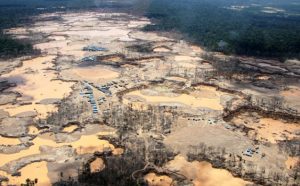WFU researchers Silman and Fernandez to be featured on NBC

Forests poisoned by mercury from gold mining.
During the summer, an NBC News crew interviewed Miles Silman, Andrew Sabin Family Foundation Professor of Conservation Biology; Luis Fernandez, executive director of Wake Forest’s Center for Amazonian Scientific Innovation (CINCIA), and other researchers working in the Madre de Dios region of Peru.
Stories about CINCIA’s work in the Peruvian Amazon are expected to air on NBC Nightly News tonight, Sept. 20 and on The Today Show at a later date.
Madre de Dios is a global biodiversity hotspot, but in recent decades has suffered an unprecedented gold rush. Mining is doing irreversible damage to one of the world’s largest remaining pieces of tropical rainforest, harming the region’s environment and its people.
“What’s happening in the western Amazon due to informal mining – the scale of the environmental and social upheaval – is amazing,” Silman said. “And so is the team of people that Wake Forest has brought together, from Peru and around the globe, to address the problem.”
CINCIA was established in 2016 through Wake Forest’s Center for Energy, Environment and Sustainability (CEES) in partnership with the U.S. Agency for International Development (USAID) and other private sector partners. CINCIA has brought together scientists and conservationists to develop transformative solutions to promote sustainable use of tropical landscapes, combat environmental destruction and improve human health in the Amazonian province of Madre de Dios.
This post was updated at 1 p.m. 9/20/22.
Categories: University Announcements
